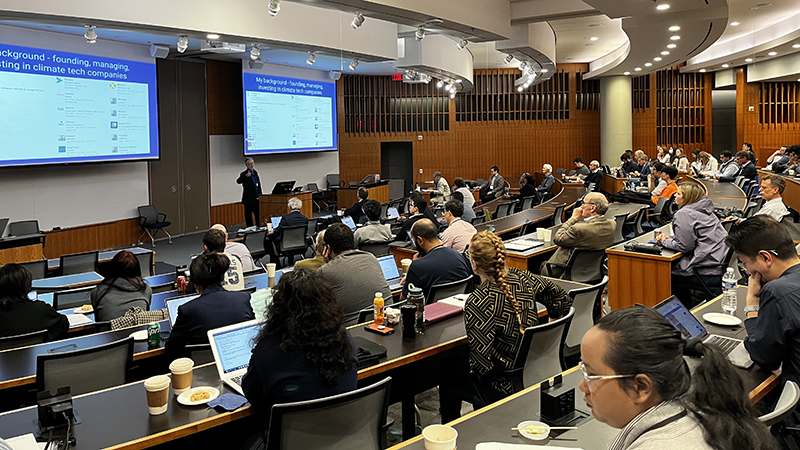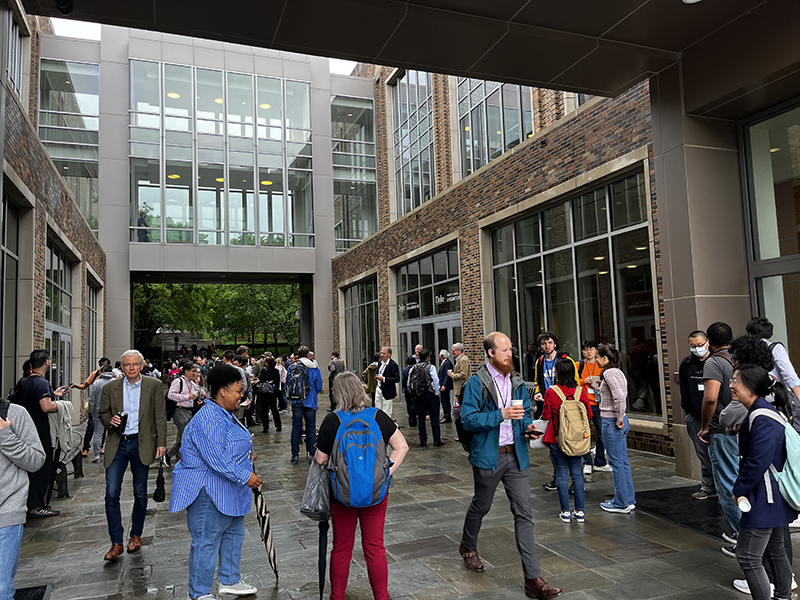Sparking Imaginative Discussions to Fight Climate Change with Materials Science
The inaugural Duke Materials Initiative Symposium on Sustainable Energy Solutions for Climate Change set a high bar for the new event series

The Duke Materials Initiative held its inaugural symposium on topics related to climate change last month. On April 28, more than 100 researchers from across the Research Triangle and the nation gathered to learn about each other’s work and build toward potential solutions related to topics in sustainable energy.
The day-long affair kicked off with remarks from Jeromy P. Lynch, the Vinik Dean of Duke University’s Pratt School of Engineering. With his own research focused on smart building initiatives and technologies for infrastructure, Lynch helped bring a sense of urgency and energy to the day’s proceedings.
“As an engineer, I know that the creation and deployment of new technologies will not come easily. And I know that of the many areas of expertise that this challenge will require, new materials for generating, transporting, and storing energy is one of the most important,” Lynch said. “That’s why I find it heartening to see so many talented and dedicated individuals committed to pursuing so many promising ideas. All of you are contributing to the solution, because there is no magic bullet – it will take solutions and discoveries from all of your lines of research to meet this grand challenge.”
“All of you are contributing to the solution, because there is no magic bullet – it will take solutions and discoveries from all of your lines of research to meet this grand challenge.”
jerome lynch
The morning continued with several talks from distinguished invited speakers. Nate Lewis, the George L. Argyros Professor of Chemistry at the California Institute of Technology gave the keynote lecture, talking briefly on the challenges society is facing having to replace fossil fuels, punctuated by models built to analyze the total cost of different approaches. He focused on the long-term energy storage solutions and concluded that hydrogen-based technologies can be the most feasible storage media to bridging the gaps between peak energy production and peak energy demand, sparking active discussions amongst the audience.
The morning continued with Dave Kirkpatrick, managing director of SJF Ventures, on the venture capital investment trend in sustainable technologies over the last 20 years and on what his company is looking for in terms of potential for future investment. David Mitzi and Volker Blum, both of Duke’s Department of Mechanical Engineering and Materials Science, gave talks on their research related to solar cell materials with a focus on what scientists can do to help the development of sustainable energy solutions.
 The afternoon session was started by Toddi Steelman, the Stanback Dean of the Nicholas School of the Environment, who gave a broad overview of what Duke is planning to do in the area of climate-change-related research, not only in science but more broadly in policy, law and society. Steelman held the rapt attention of the audience, which was very interested in learning the steps taken by Duke along these directions and asked about how to be more involved in the overall activities.
The afternoon session was started by Toddi Steelman, the Stanback Dean of the Nicholas School of the Environment, who gave a broad overview of what Duke is planning to do in the area of climate-change-related research, not only in science but more broadly in policy, law and society. Steelman held the rapt attention of the audience, which was very interested in learning the steps taken by Duke along these directions and asked about how to be more involved in the overall activities.
“Events like this symposium highlight the importance of innovative, pathbreaking science in helping address the climate challenge,” Steelman said. “The research taking place in materials science today will provide us with the workable solutions for tomorrow.”
Following Steelman, Jie Liu, the George Barth Geller Distinguished Professor of Chemistry at Duke, talked about his research on photo plasmonic catalysis and its promise toward full-spectrum solar energy applications. Next, Jerry Meyer, professor of chemistry at the University of North Carolina – Chapel Hill, talked about his lab’s work on solar fuel and was followed by an interesting talk from Nikhil Malvankar, associate professor of molecular biophysics and biochemistry at Yale University on biological systems that can contribute to climate change research as well as a talk from Wei You, professor and chair of chemistry and applied physical science, on improving the stability of organic solar cells.

“Events like this symposium highlight the importance of innovative, pathbreaking science in helping address the climate challenge. The research taking place in materials science today will provide us with the workable solutions for tomorrow.”
toddi steelman
A highlight of the symposium was the panel discussion chaired by Eric Rohlfing, energy executive-in-residence at Duke, which featured general discussion in an open and frank environment on what are the biggest challenges the world is facing in climate change and what are their potential solutions. While there were a wide array of opinions, a consensus was reached that scientists and policymakers need to find ways to replace fossil fuels in all aspects of society, and that one of the best solutions is to start with sustainable energy sources, including nuclear, while using hydrogen as a media to store extra energy for longer terms. It was also pointed out that hydrogen can also be converted into more easily transportable fuels for other applications, including transportation. It was generally agreed that lithium-ion batteries are not a long-term solution for energy storage, and that batteries beyond lithium need to be one of the focuses in future research topics.
After the panel session concluded, a poster session featuring the work of students continued to spark active discussions well into the afternoon. Afterward, all of the invited speakers met for dinner to end the scientifically inspiring day.
“This symposium not only served to show how much work is going on in energy-related materials in the Triangle, but also helped to kickstart new projects and collaborations,” said Stefan Zauscher, co-director of the Duke Materials Initiative and professor of mechanical engineering and materials science. “Thanks to the convening power of the Duke Materials Initiative, I expect to see more symposia and workshops in the near future focused on materials that address different aspects of sustainability and climate change.”
